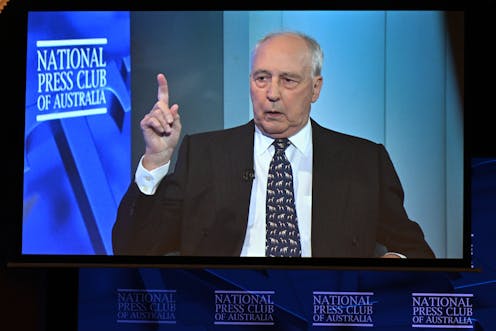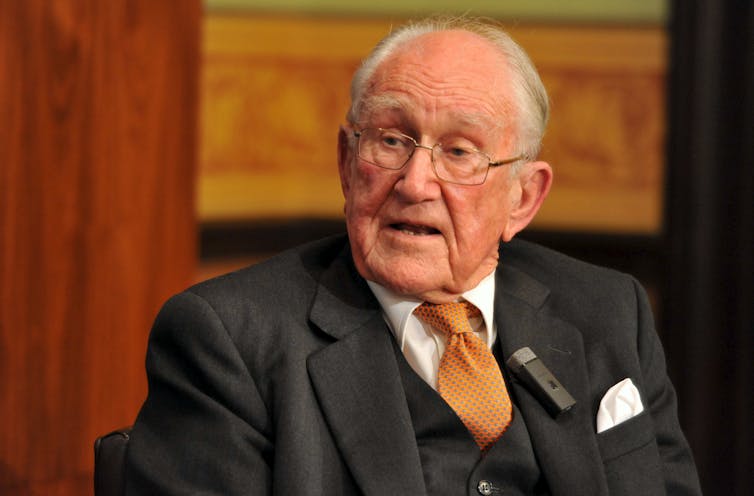Source: The Conversation (Au and NZ) – By Joshua Black, PhD Candidate, School of History, National Centre of Biography, Australian National University

Mick Tsikas/AAP
In a television interview with Phillip Adams in 1999, Paul Keating remarked that he retained much influence on the international stage.
I still have most of the access […] throughout the world, in Asia in particular, that I had as prime minister.
This was a calm and contented Keating, barely three years out of office but comfortable in the knowledge his voice continued to be heard in the right quarters.
His recent appearance at the National Press Club to talk about the AUKUS pact between Australia, Britain and the United States (under the auspices of which Australia is purchasing up to five nuclear-powered submarines for the princely sum of $368 billion) was mostly devoid of that quality.
Keating called it the “worst deal in all history” and lampooned Prime Minister Anthony Albanese as the only “payer” of the pact. He was especially critical of Foreign Minister Penny Wong: “Running around the Pacific with a lei around your neck, handing out money, which is what Penny does, is not foreign policy”.
There were important and sage policy points on offer, but there was something a little unseemly about the polemic, and even more so about his complaint the prime minister’s office hadn’t heeded his advice. Those cognisant of Labor’s history might have been reminded of former NSW Premier Jack Lang, at whose feet Keating learned much of his politics in the 1960s and 1970s, and whose trenchant criticism of the party earned him many enemies over the decades.
It is easy to assume this kind of intervention is the natural corollary of losing power, egotism and what former Foreign Minister Gareth Evans called “relevance deprivation syndrome”. In fact, the spectre of a disgruntled former prime minister speaking out against their own party is a relatively recent one, a product of Australia’s modern, personalised political culture.
Read more:
Paul Keating lashes Albanese government over AUKUS, calling it Labor’s biggest failure since WW1
Death and duty
In the 20th century, several of Australia’s leaders died before they could enjoy any kind of retirement in which to disrupt their successors. Alfred Deakin’s health declined rapidly in the years after he left office, preventing him from making significant contributions to public life in the years afterwards. Joe Lyons and John Curtin both died in office, as did Ben Chifley, while serving as opposition leader. Harold Holt disappeared at Cheviot Beach in December 1967.
The survivors, it has to be said, were put to good public use after leaving office. Edmund Barton served the remainder of his days on the High Court, while George Reid and Andrew Fisher both went to London to serve as Australian High Commissioner. The former even took a seat in the British House of Commons in the final years of his life.
Stanley Melbourne Bruce, who lost government and his own seat at the 1929 federal election, was returned to parliament in 1931 and served as a minister in Joe Lyons’ government, before emulating Reid and Fisher by serving as High Commissioner in London and going to the House of Lords. Depression-era prime minister James Scullin remained an MP for a further 18 years after losing power in 1931, reputedly offering much wise counsel to Curtin and Chifley throughout the 1940s.
Former prime ministers were once a little more reticent about sparring with their successors in public, especially when it came to sensitive policy matters. Fisher despaired when his successor, Billy Hughes, campaigned for military conscription in 1916. But the former prime minister used his office as High Commissioner to abstain from commenting on the referendum, which failed.
Robert Menzies was so disappointed with his Liberal successors, according to biographer Troy Bramston, that he may not have even voted for the Liberal Party in 1972, preferring the Democratic Labor Party.
But he would never have admitted this publicly. Instead, he used his post-prime ministerial public appearances to wax lyrical about the British Commonwealth and bemoan its declining relevance.
Liberal Prime Minister Malcolm Fraser consulted Menzies periodically during the party elder’s final years.
Statesmen on the loose?
There is a longer history, though, of former prime ministerial interventions in debates about Australia’s strategic and defence policy. These were, after all, vital questions in the 20th century.
When Bruce proposed in 1924 to build two new Commonwealth naval cruisers in Britain rather than Australia, his Nationalist predecessor Hughes was irate, and said so from the backbench. “Are we such spineless anaemic creatures”, he asked, “as to be incapable of bearing the great responsibilities which free government imposes upon us?”
Hughes would play the role of provocateur again. In 1934, he published a short book called The Price of Peace, in which he called for a more urgent approach to preparation for conflict in the Pacific. An updated version was reissued the following year under the title Australia and the War Today, but it was highly controversial. Hughes was now a minister in a government whose foreign policy toward aggressors depended on economic sanctions, which he had described in the book as “either an empty gesture or war”. His resignation promptly followed.
More recent interventions have taken defence policy and strategic complacency as their concern, too. A year before his death, Malcolm Fraser published a polemical book called Dangerous Allies (2014), in which he argued against Australia’s bipartisan “strategic dependence” on the United States.
Speaking on daytime television, he warned that Australia’s partnership with the US could see it implicated in “major conflict” in the Pacific. He was, in this respect, equally critical of both major parties for what he perceived as subservience to American strategic interests.
Read more:
Book review: Dangerous Allies by Malcolm Fraser
The AUKUS pact, in its short life, has served as the launching pad for ex-leaders other than Keating to launch powerful attacks on successors. When Scott Morrison announced the initial agreement in 2021, his predecessor Malcolm Turnbull used a press club broadcast to argue Morrison had “not acted in good faith” in reneging on the existing submarine deal with France that he, Turnbull, had signed in 2016.
Morrison, Turnbull fulminated, had “deceived” France. Australian voters saw the French president and their own prime minister’s immediate predecessor calling the incumbent a liar.
Fights, feuds and frustrated men
In recent decades, Australians have become inured to bitter and emotional feuds between their former leaders. There are several reasons for this trend, including the increasingly personalised nature of politics since the 1970s, high rates of leadership attrition, and the thirst of media providers for easy news stories that hinge on personal animosity and Shakespearean intrigue.
A former leader criticising their own party is deemed the height of newsworthiness. John Howard and Julia Gillard have uniquely resisted the temptation. Howard had some stern words for his Liberal successors last year in a book called A Sense of Balance, but the book appeared after the Morrison government had been defeated. Gillard, for her part, has been almost unfailingly measured and dignified in her public pronouncements since 2013.
For those who did return to the fray of policy combat, the personal and the political were inseparable. For much of the 1980s, Gough Whitlam was anguished by the way Hawke government ministers treated his legacy. As Jenny Hocking has shown in her biography of Whitlam, Hawke and Whitlam clashed repeatedly as the Labor Party walked away from big 1970s initiatives such as free tertiary education, an ambitious Aboriginal land rights agenda and much else. When treasurer Keating joked about the “chasm” between Whitlam’s policy aspirations and his actual achievements, Whitlam returned serve by calling him a “smart-arse”.
Where race relations and national identity have been concerned, the fall-outs between Australian ex-PMs have been that much more embittered. A great defender of refugees and asylum seekers, Fraser spoke publicly about his abhorrence of the Howard government’s approach to border protection and mandatory offshore detention. When Tony Abbott took the leadership of the Liberal Party in December 2009 promising to “stop the boats”, Fraser resigned his life membership in protest.

Joel Carrett/AAP
Keating’s attack on the Labor Party is not unprecedented for a former prime minister, but it isn’t historically commonplace either. There is no doubt his criticisms have been heard, but their influence remains to be seen.
![]()
Joshua Black does not work for, consult, own shares in or receive funding from any company or organisation that would benefit from this article, and has disclosed no relevant affiliations beyond their academic appointment.
– ref. Hell hath no fury like a former PM – but it wasn’t always so – https://theconversation.com/hell-hath-no-fury-like-a-former-pm-but-it-wasnt-always-so-204196






